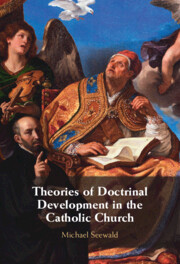Book contents
- Theories of Doctrinal Development in the Catholic Church
- Theories of Doctrinal Development in the Catholic Church
- Copyright page
- Contents
- Acknowledgements
- Introduction: What Is This Book About?
- 1 Defining Dogma and Development
- 2 The Bible: Both Product and Yardstick of Doctrinal Development
- 3 How the Early Church Reflected on Doctrinal Continuity and Change
- 4 Discussions in the Middle Ages on Changes to the Unchanging Faith
- 5 Theories of Doctrinal Development in the Nineteenth and Early Twentieth Century
- 6 The Twentieth Century: From Anti-Modernism to the Second Vatican Council
- 7 Overview and Outlook
- Epilogue: An ‘Obituary’ to the Church?
- Bibliography
- Index
6 - The Twentieth Century: From Anti-Modernism to the Second Vatican Council
Published online by Cambridge University Press: 18 February 2023
- Theories of Doctrinal Development in the Catholic Church
- Theories of Doctrinal Development in the Catholic Church
- Copyright page
- Contents
- Acknowledgements
- Introduction: What Is This Book About?
- 1 Defining Dogma and Development
- 2 The Bible: Both Product and Yardstick of Doctrinal Development
- 3 How the Early Church Reflected on Doctrinal Continuity and Change
- 4 Discussions in the Middle Ages on Changes to the Unchanging Faith
- 5 Theories of Doctrinal Development in the Nineteenth and Early Twentieth Century
- 6 The Twentieth Century: From Anti-Modernism to the Second Vatican Council
- 7 Overview and Outlook
- Epilogue: An ‘Obituary’ to the Church?
- Bibliography
- Index
Summary
Although the election of Benedict XV brought to an end the intense phase of the so-called modernism crisis, the narrowing of discussion that an anti-modernist magisterium imposed on the Church far outlasted the pontificate of Pius X. Taking the form of the anti-modernist oath, which was not officially abolished until 1967, it shaped theological discussions until the Second Vatican Council. As a result, the respected theories of development of the nineteenth century, which were all apologetic in tendency (i.e. all wanted to defend the legitimacy of Catholic doctrine against the inquiries of a critical history of dogma that suspected dogma of radical discontinuity), could barely find their feet in the first half of the twentieth century. As a prototype of the theologian who fell from apologetics to heresy, and finally to excommunication, Alfred Loisy served as a negative example to everybody.
- Type
- Chapter
- Information
- Theories of Doctrinal Development in the Catholic Church , pp. 143 - 169Publisher: Cambridge University PressPrint publication year: 2023



